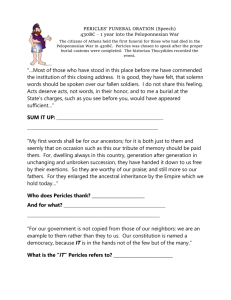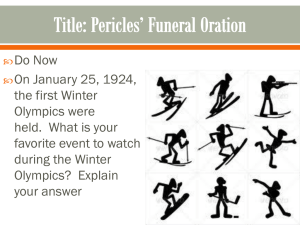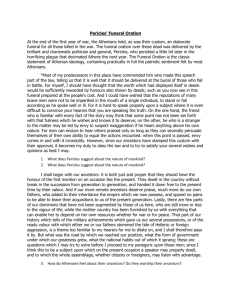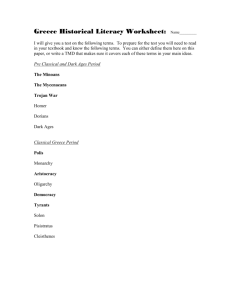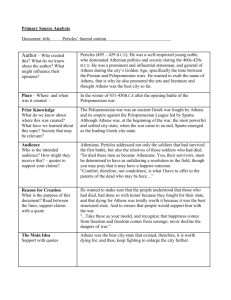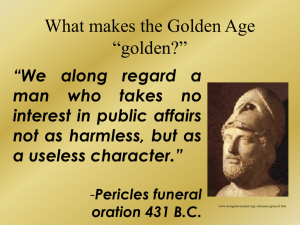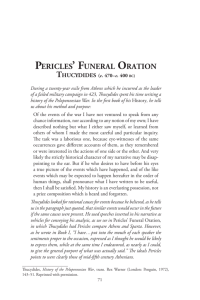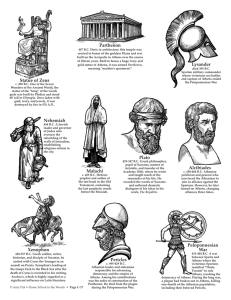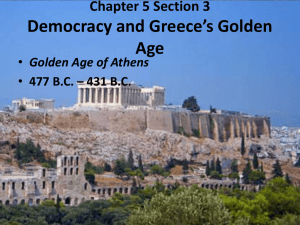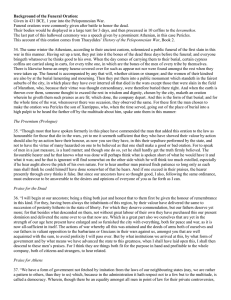Pericles' Funeral Oration
advertisement
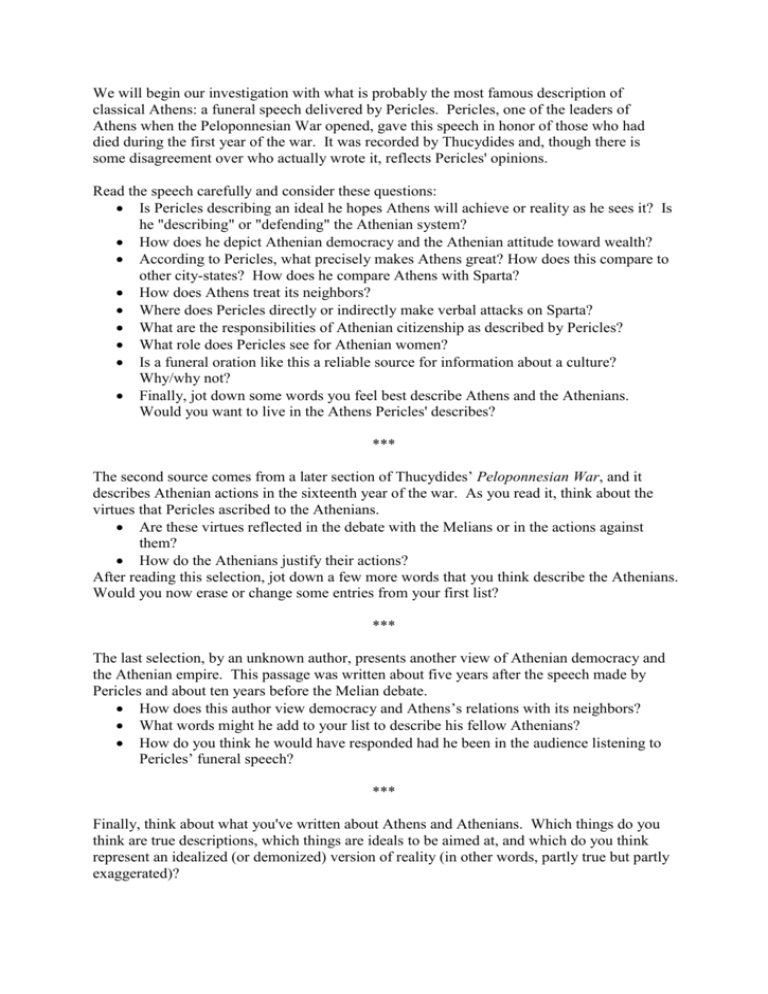
We will begin our investigation with what is probably the most famous description of classical Athens: a funeral speech delivered by Pericles. Pericles, one of the leaders of Athens when the Peloponnesian War opened, gave this speech in honor of those who had died during the first year of the war. It was recorded by Thucydides and, though there is some disagreement over who actually wrote it, reflects Pericles' opinions. Read the speech carefully and consider these questions: Is Pericles describing an ideal he hopes Athens will achieve or reality as he sees it? Is he "describing" or "defending" the Athenian system? How does he depict Athenian democracy and the Athenian attitude toward wealth? According to Pericles, what precisely makes Athens great? How does this compare to other city-states? How does he compare Athens with Sparta? How does Athens treat its neighbors? Where does Pericles directly or indirectly make verbal attacks on Sparta? What are the responsibilities of Athenian citizenship as described by Pericles? What role does Pericles see for Athenian women? Is a funeral oration like this a reliable source for information about a culture? Why/why not? Finally, jot down some words you feel best describe Athens and the Athenians. Would you want to live in the Athens Pericles' describes? *** The second source comes from a later section of Thucydides’ Peloponnesian War, and it describes Athenian actions in the sixteenth year of the war. As you read it, think about the virtues that Pericles ascribed to the Athenians. Are these virtues reflected in the debate with the Melians or in the actions against them? How do the Athenians justify their actions? After reading this selection, jot down a few more words that you think describe the Athenians. Would you now erase or change some entries from your first list? *** The last selection, by an unknown author, presents another view of Athenian democracy and the Athenian empire. This passage was written about five years after the speech made by Pericles and about ten years before the Melian debate. How does this author view democracy and Athens’s relations with its neighbors? What words might he add to your list to describe his fellow Athenians? How do you think he would have responded had he been in the audience listening to Pericles’ funeral speech? *** Finally, think about what you've written about Athens and Athenians. Which things do you think are true descriptions, which things are ideals to be aimed at, and which do you think represent an idealized (or demonized) version of reality (in other words, partly true but partly exaggerated)? Pericles' Funeral Oration (Thucydides, 430 B. C. E.) At the end of the first year of the Peloponnesian war, the Athenians held ( as was their custom) an elaborate funeral for all those killed in the war. The funeral oration over these dead was delivered by the brilliant and charismatic politician and general, Pericles. The Funeral Oration is the classic statement of Athenian ideology, containing practically in full the patriotic sentiment felt by many Athenians. I have no wish to make a long speech on subjects familiar to you all: so I shall say nothing about the warlike deeds by which we acquired our power or the battles in which we or our fathers gallantly resisted our enemies, Greek or foreign. What I want to do is, in the first place, to discuss the spirit in which we faced our trials and also our constitution and the way of life which has made us great. After that I shall speak in praise of the dead, believing that this kind of speech is not inappropriate to the present occasion, and that this whole assembly, of citizens and foreigners, may listen to it with advantage. Let me say that our system of government does not copy the institutions of our neighbors. It is more the case of our being a model to others, than of our imitating anyone else. Our constitution is called a democracy because power is in the hands not of a minority but of the whole people. When it is a question of settling private disputes, everyone is equal before the law; when it is a question of putting one person before another in positions of public responsibility, what counts is not membership of a particular class, but the actual ability which the man possesses. No one, so long as he has it in him to be of service to the state, is kept in political obscurity because of poverty. And, just as our political life is free and open, so is our day-to-day life in our relations with each other. We do not get into a state with our next-door neighbor if he enjoys himself in his own way, nor do we give him the kind of black looks which, though they do no real harm, still do hurt people’s feelings. We are free and tolerant in our private lives; but in public affairs we keep to the law. This is because it commands our deep respect. We give our obedience to those whom we put in positions of authority, and we obey the laws themselves, especially those which are for the protection of the oppressed, and those unwritten laws which it is an acknowledged shame to break. And here is another point. When our work is over, we are in a position to enjoy all kinds of recreation for our spirits. There are various kinds of contests and sacrifices regularly throughout the year; in our own homes we find a beauty and a good taste which delight us every day and which drive away our cares. Then the greatness of our city brings it about that all the good things from all over the world flow in to us, so that to us it seems just a natural to enjoy foreign goods as our own local products. Then there is a great difference between us and our opponents, in our attitude towards military security. Here are some examples: Our city is open to the world, and we have no periodical deportations in order to prevent people observing or finding out secrets which might be of military advantage to the enemy. This is because we rely, not on secret weapons, but on our real courage and loyalty. There is a difference, too, in our educational systems. The Spartans, from their earliest boyhood, are submitted to the most laborious training in courage; we pass our lives without all these restrictions, and yet are just as ready to face the same dangers as they are. Here is a proof of this: When the Spartans invade our land, they do not come by themselves, but bring all their allies with them; whereas we, when we launch an attack abroad, do the job ourselves, and, though fighting on foreign soil, do not often fail to defeat opponents who are fighting for their own hearth and homes. As a matter of fact none of our enemies has ever yet been confronted with our total strength, because we have to divide our attention between our navy and the many missions on which our troops are sent on land. Yet, if our enemies engage a detachment of our forces and defeat it, they give themselves credit for having thrown back our entire army; or, if they lose, they claim they were beaten by us in full strength. There are certain advantages, I think, in our way of meeting danger voluntarily, with an easy mind, instead of with a laborious training, with natural rather than with state-induced courage. We do not have to spend our time practicing to meet sufferings which are still in the future; and when they are actually upon us we show ourselves just as brave as these others who are always in strict training. This is one point in which, I think, our city deserves to be admired. There are also others: Our love of what is beautiful does not lead to extravagance; our love of the things of the mind does not make us soft. We regard wealth as something to be properly used, rather than as something to boast about. As for poverty, no one need be ashamed to admit it: the real shame is in not taking practical measures to escape from it. Here each individual is interested not only in his own affairs but in the affairs of the state as well; even those who are mostly occupied with their own business are extremely well informed on general politics—this is a peculiarity of ours: we do not say that a man who takes no interest in politics is a man who minds his own business; we say that he has no business here at all. We Athenians, in our own persons, take our decisions on policy or submit them to proper discussions: for we do not think that there is an incompatibility between words and deeds; the worst thing is to rush into action before the consequences have been properly debated. And this is another point where we differ from other people. We are capable at the same time of taking risks and of estimating them beforehand. Others are brave out of ignorance; and, when they stop to think, they begin to fear. But the man who can most truly be accounted brave is he who best knows the meaning of what is sweet in life and of what is terrible, and then goes out undeterred to meet what is to come. Again, in questions of general good feeling there is a great contrast between us and most other people. We make friends by doing good to others, not be receiving good from them. This makes our friendship all the more reliable, since we want to keep alive the gratitude of those who are in our debt by showing continued goodwill to them: whereas the feelings of one who owes us something lack the same enthusiasm, since he knows that, when he repays our kindness, it will be more like paying back a debt than giving something spontaneously. We are unique in this. When we do kindnesses to others, we do not do them out of any calculations of profit or loss: we do them without afterthought, relying on our free liberality. In short, I declare that our city is an education to Greece, and I declare that in my opinion each single one of our citizens, in all the manifold aspects of life, is able to show himself the rightful lord and owner of his own person, and do this, moreover, with exceptional grace and exceptional versatility. And to show that this is no empty boasting for the present occasion, but real tangible fact, you have only to consider the power which our city possesses and which has been won by those very qualities which I have mentioned. Athens, alone of the states we know, comes to her testing time in a greatness that surpasses what was imagined of her. In her case, and in her case alone, no invading enemy is ashamed at being defeated, and no subject can complain of being governed by people unfit for their responsibilities. Mighty indeed are the marks and monuments of our empire which we have left. Future ages will wonder at us, as the present age wonders at us now. We do not need the praises of a Homer, or of anyone else whose words may delight us for the moment, but whose estimation of facts will fall short of what is really true. For our adventurous spirit has forced an entry into every sea and into every land; and everywhere we have left behind us everlasting memorials of good done to our friends or suffering inflicted on our enemies. This, then, is the kind of city for which these men, who could not bear the thought of losing her, nobly fought and nobly died. It is only natural that every one of us who survive them should be willing to undergo hardships in her service. And it was for this reason that I have spoken at length about our city, because I wanted to make it clear that for us there is more at stake than there is for others who lack our advantages. … So and such they were, these men - worthy of their city. We who remain behind may hope to be spared their fate, but must resolve to keep the same daring spirit against the foe. It is not simply a question of estimating the advantages in theory. You should fix your eyes every day on the greatness of Athens as she really is, and should fall in love with her. When you realize her greatness, then reflect that what made her great was men with a spirit of adventure, men who knew their duty, men who were ashamed to fall below a certain standard. If they ever failed in an enterprise, they made up their minds that at any rate the city should not find their courage lacking to her, and they gave to her the best contribution that they could.… Make up your minds that happiness depends on being free, and freedom depends on being courageous. Let there be no relaxation in face of the perils of the war. … For these reasons I shall not communicate with the parents of the dead, who are here. Instead I shall try to comfort them. They are well aware that they have grown up in a world where there are many changes and chances. But this is good fortune — for men to end their lives with honor, as these have done, and for you honorably to lament them: their life was set to a measure where death and happiness went hand in hand. … As for those of you here who are sons or brothers of the dead, I can see a hard struggle in front of you. Everyone always speaks well of the dead, and, even if you rise to the greatest heights of heroism, it will be a hard thing for you to get the reputation of having come near, let alone equaled, their standard. … Perhaps I should say a word or two on the duties of women to those among you who are now widowed. I can say all I have to say in a short word of advice. Your great glory is not to be inferior to what God has made you, and the greatest glory of a woman is to be least talked about by men, whether they are praising you or criticizing you. I have now, as the law demanded, said what I had to say. For the time being our offerings to the dead have been made, and for the future their children will be supported at the public expense by the city, until they come of age. This is the crown and prize which she offers, both to the dead and to their children, for the ordeals which they have faced. Where the rewards of valor are the greatest, there you will find also the best and bravest spirits among the people. And now, when you have mourned for your dear sons, you must depart. Source: History of the Peloponnesian War, translation by Rex Warner (New York: Penguin Books, 1986), 143151
